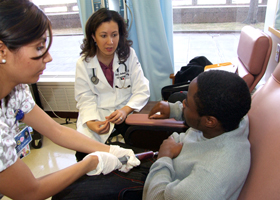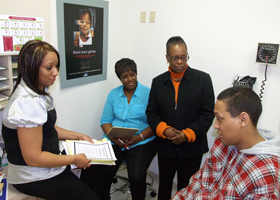Feature Story
Health Center Today, March 24, 2010
Health Center Starts Adult Sickle Cell Program
By Chris DeFrancesco

Oncology nurse Minal Patel performs a blood transfusion on a sickle cell disease patient in the Neag Comprehensive Cancer Center. Dr. Biree Andemariam (center) has started an adult sickle cell disease program at the UConn Health Center. The patient, Chad Bruce, 25, says heís had to get blood transfusions every three weeks since he was 7.
Children who grow up with the hereditary blood disorder sickle cell disease wonít outgrow it, often leaving them in a sort of "no manís land" for their care as adults.
Recognizing this, Dr. Biree Andemariam, a hematologist in the Carole and Ray Neag Comprehensive Cancer Center, is leading an effort to help patients transition out of pediatric care with the establishment of an adult sickle cell disease program at the Health Center.
The transitional function, a collaboration with the Connecticut Childrenís Medical Center, is just part of it. Andemariam works with nurses and a social worker to see sickle cell patients in the Neag Comprehensive Cancer Center, and on Tuesdays, sheís joined by a case worker and a patient care navigator from the New Britain group Citizens for Quality Sickle Cell Care.
"Previously, most adults with sickle cell disease resorted to using emergency departments for routine care," Andemariam says. "Now they have a place to call home."
Sickle cell disease is a disorder of hemoglobin, a molecule abundant within the circulating red blood cell. Hemoglobin is responsible for the red blood cell's ability to deliver oxygen to the organs. People with sickle cell disease have a hemoglobin abnormality that distorts the shape of their red blood cells, causing them to be stiff and rigid. This leads to impaired circulation and oxygen delivery to the tissues, eventually leading over time to widespread organ dysfunction and severe pain.
"Complications include severe recurrent pain, stroke, lung, kidney, liver or spleen dysfunction, chronic skin ulcers, and blindness," Andemariam says. "Even pregnancy can be risky. Median survival is around age 40."
Andemariam, recently named one of the first recipients of a Connecticut Institute for Clinical and Translational Science Award for Mentored Research for her study of sickle cell disease, says about 80,000 people in the United States Ė and millions worldwide Ė have sickle cell disease. It has a higher prevalence in those of African, Hispanic, Caribbean, South American, Mediterranean, and Indian ancestry.

The New Britain-based group Citizens for Quality Sickle Cell Care is a partner in the Health Centerís new adult sickle cell disease program. From left, system navigator Delita Rose-Daniels, case manager Monica Carr, and Executive Director Virginia Pertillar counsel a patient in the Neag Comprehensive Cancer Center.
Her new sickle cell disease program, part of the Leaís Foundation Center for Hematologic Disorders, also includes clinical trials and lab research.
"Bone marrow transplantation is curative, but very risky, and new therapies are virtually non-existent," Andemariam says. "Most treatment is palliative, not preventative; we have a long way to go. This is why we conduct research in addition to providing comprehensive care. We want to develop novel therapies and perhaps even cures."
Until then, one of the best defenses against sickle cell disease is education. For example, itís possible for a mother and father who donít have sickle cell disease to have a baby who does.
"Everyone has two copies of hemoglobin DNA," Andemariam says. "If you inherit one abnormal, or sickle cell copy, you have the trait, not the disease. If you inherit two abnormal copies, you have the disease. Sickle cell disease trait can be carried by an individual and not cause disease."
But it can cause disease in offspring. The child of two carriers of the sickle cell trait has a one-in-four chance of being born with sickle cell disease.
Andemariam is partnering with Citizens for Quality Sickle Cell Care and the Department of Public Health to encourage screening in the community and raise public awareness about the potential risks associated with being carriers of the sickle cell trait.


